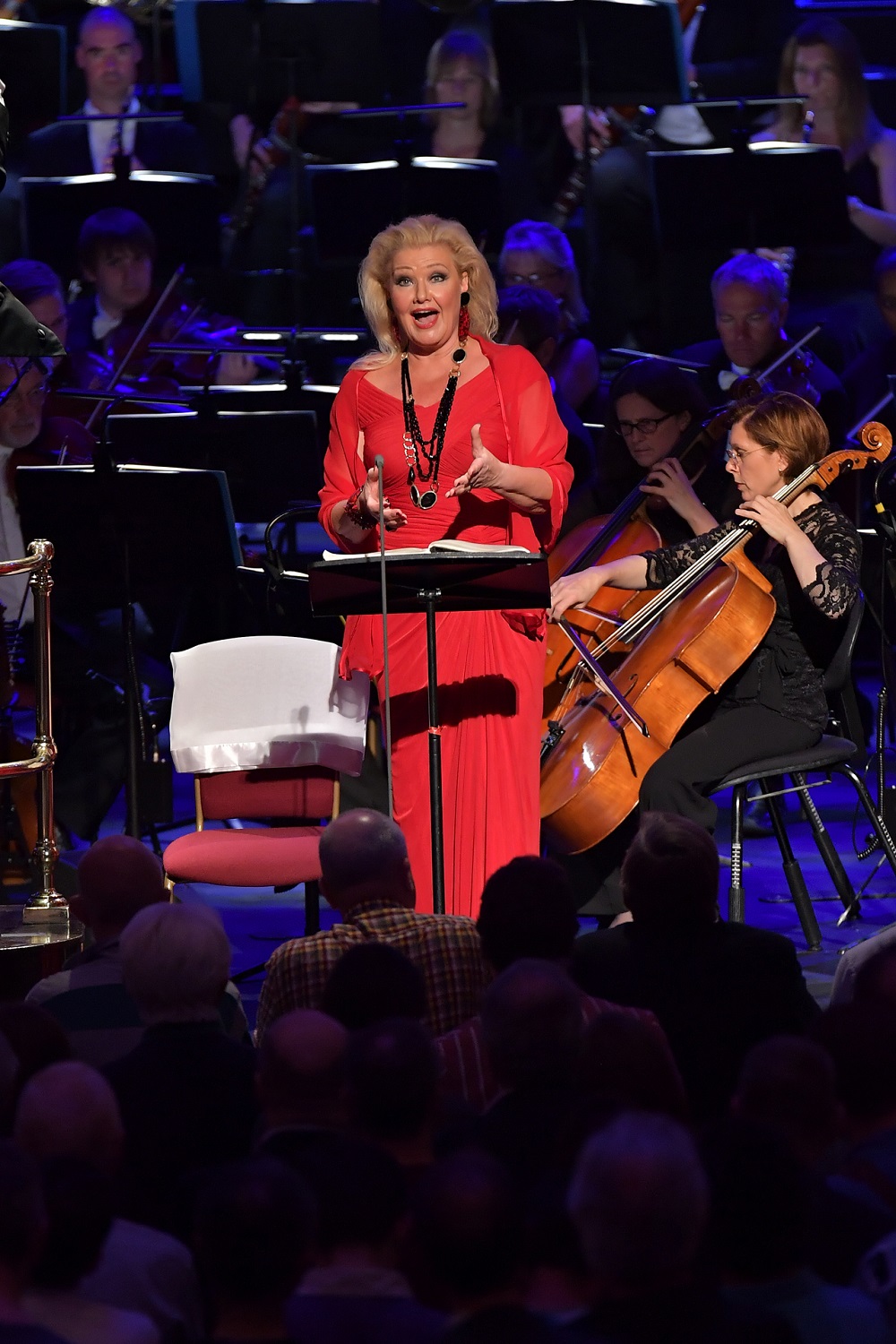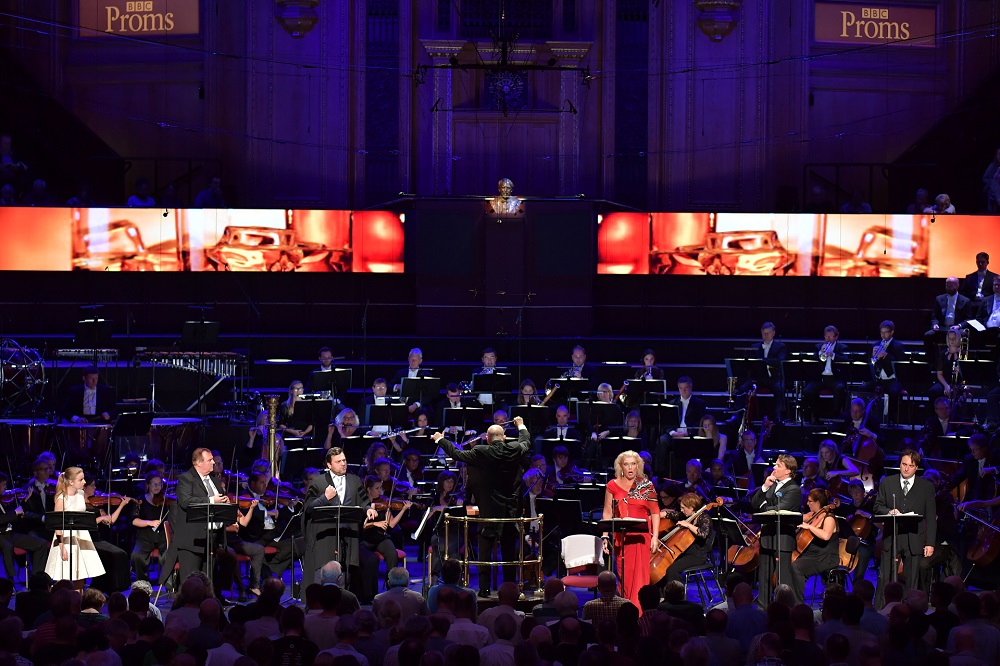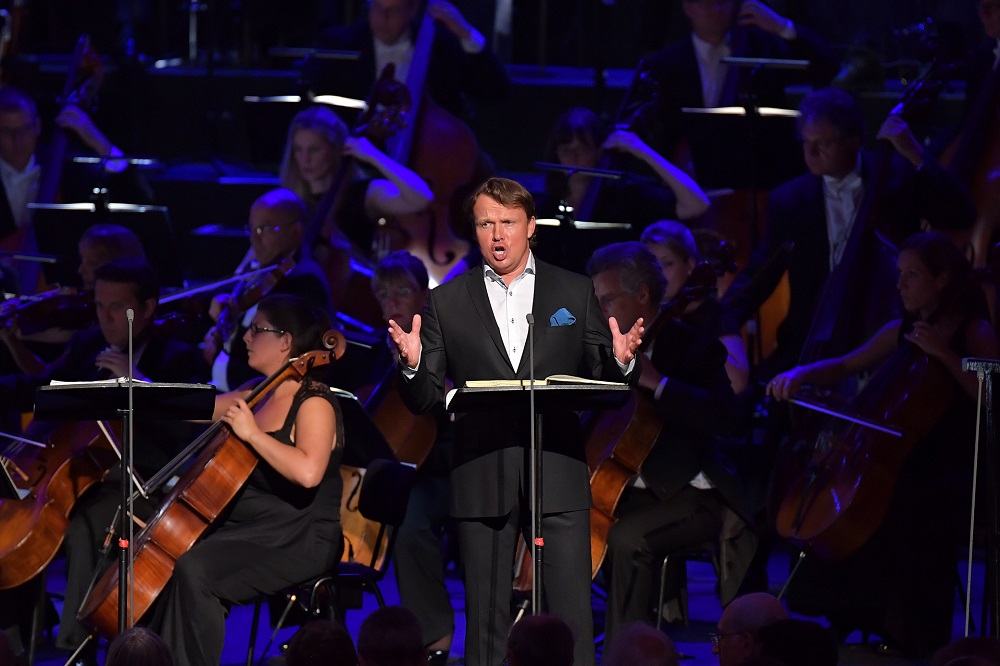Prom 45: The Makropulos Affair, BBCSO, Bělohlávek | reviews, news & interviews
Prom 45: The Makropulos Affair, BBCSO, Bělohlávek
Prom 45: The Makropulos Affair, BBCSO, Bělohlávek
Karita Mattila, in incandescent company, is Janáček's long-lived diva to the life
Karel Čapek, the great Czech writer who pioneered some of the most prophetic dramatic fantasies of the early 20th century, thought Janáček was nuts to want to set his wordy play about a 337-year-old woman to music. He could not have anticipated what that septuagenarian genius would achieve. Some of us felt similarly doubtful about singers performing this most conversational of operas with scores and music stands in a "concert staging".
This, in short, was the most electrifying Proms opera since Nina Stemme and Donald Runnicles pulled it off in Strauss’s Salome, and so many things that the concert Jenůfa at the Festival Hall in April, for all its sonic beauties, was not. Karita Mattila (pictured below in Act One), glued to the score on that occasion in preparation for a role she had yet to sing on stage, knows the part of the 1920s diva Emilia Marty, born Elina Makropulos in 1585, inside out. With her ageless beauty and that unique incandescent sound, Mattila can embody the strangeness of a woman whose soul has died within her and yet who still longs for release.

As for the great final scene (pictured below), where the diva tells the assembled company how lucky they are to have a natural life span where everything still has meaning, Mattila kept it simple, allowing the voice to pour forth an emotional stream of Janáček's unique bel canto. Plenty before this was beautiful to listen to; the role may have had great singing-actresses to thrill on stage, above all the inimitable Anja Silja at Glyndebourne, but it has surely never sounded so lovely as well as expressive.
The same could be said for a BBC Symphony Orchestra on simply amazing form under Jiří Bělohlávek, who knows the Janáček scores probably better than any other living conductor. If his Jenůfa with the Czech Philharmonic projected warmth but not bite, the typical sound of a Bohemian ensemble rather than one from Janáček's native Moravia, this – like the playing of the ENO Orchestra under Mark Wigglesworth in a near-perfect Jenůfa – captured both, and specifically the fire and ice of a more singularly orchestrated score, projecting into the hall the inspired ideas, enough for 10 operas, which drive the music forwards for a minute or two each and then are gone.
Seconds into the longest of the composer's operatic preludes, pittting passion against the fanfares of the past – as in Wagner's Lohengrin, the composer doesn’t reveal what the other-worldly music means until the Act Three denouement – we were hearing unbelievable sounds from piccolo and first horn, ostinato figures usually smothered by the strings. The clarinet family, too, worked wonders of warming colour, and Bělohlávek's pacing was a miracle – letting sympathy surface through the legal wranglings early in the action through a held chord, a dramatic silence, working the spaces of a hall he knows well not just as a conductor but also as an Arena Prommer.
All the singers delivering idiomatic Czech were simply perfect, as the supporting cast had been in the concert Jenůfa. Four tenors, older and younger, reminded us how Janáček's homeland still produces a special type of high voice type. Aleš Briscein (pictured below) as Albert Gregor went for the top notes fearlessly and conveyed all the bewilderment of the non-love scenes with the woman who turns out to be his grandmother (or great-great-great-great-grandmother, as Marty later claims). It sounds as if Aleš Voráček, as the hapless Janek bewitched by Marty and bullied by his nasty father Baron Prus (Svatopluk Sem, as vivid in dark-hued projection as Gustáv Beláček's lawyer Kolenatý), also has a future in major roles. Eva Štěrbová as Janek's girlfriend Krista, the young singer infatuated with the diva's example, characterised beautifully – spirited and debutantish like The Sound of Music's Liesl in Act One, conveying numb misery and then acceptance simply by her body language towards the end as Marty's fate becomes clear.
Never underestimate the role of a director in a concert performance like this. Kenneth Richardson and his (uncredited) design team did a fine job. Costumes were right, as the evening dress had palpably not been in the Festival Hall Jenůfa, and for once the back display, which reached an apogee of hideousness at the start of Wednesday night's Prom with mint-green toothpaste swirls against black for Barenboim and the West-Eastern Divan Orchestra, had meaningful and well formed images. I liked the brief appearances of the telephone, the old portrait of Mattila when the question of a signed photograph arises, the booze for Marty's drunken revelations (just a pity that this last detail didn't yield to a portrait of Rudolf II when Marty narrates the history of the life elixir).
We also got green, as the stage directions indicate, at the start of the most exultant of operatic endgames, yielding to a magnesium flare as the elixir's prescription finally goes up in flames.This of all Proms should have been televised; we could have watched it again and again with subtitles to boot. As it is, the visuals, above all Mattila's diverse poses, will live on in the minds of those who saw them, while the astonishing sounds can continue to resonate, for a while at least, on iPlayer.
rating
Share this article
The future of Arts Journalism
You can stop theartsdesk.com closing!
We urgently need financing to survive. Our fundraising drive has thus far raised £33,000 but we need to reach £100,000 or we will be forced to close. Please contribute here: https://gofund.me/c3f6033d
And if you can forward this information to anyone who might assist, we’d be grateful.

Subscribe to theartsdesk.com
Thank you for continuing to read our work on theartsdesk.com. For unlimited access to every article in its entirety, including our archive of more than 15,000 pieces, we're asking for £5 per month or £40 per year. We feel it's a very good deal, and hope you do too.
To take a subscription now simply click here.
And if you're looking for that extra gift for a friend or family member, why not treat them to a theartsdesk.com gift subscription?
more Opera
 Help to give theartsdesk a future!
Support our GoFundMe appeal
Help to give theartsdesk a future!
Support our GoFundMe appeal
 Simon Boccanegra, Opera North review - ‘dramatic staging’ proves its worth
Verdi’s political tragedy - and plea for peace - has impact in a grand Yorkshire setting
Simon Boccanegra, Opera North review - ‘dramatic staging’ proves its worth
Verdi’s political tragedy - and plea for peace - has impact in a grand Yorkshire setting
 Peter Grimes, Welsh National Opera review - febrile energy and rage
In every sense a tour de force
Peter Grimes, Welsh National Opera review - febrile energy and rage
In every sense a tour de force
 Owen Wingrave, RNCM, Manchester review - battle of a pacifist
Orpha Phelan brings on the big guns for Britten’s charge against war
Owen Wingrave, RNCM, Manchester review - battle of a pacifist
Orpha Phelan brings on the big guns for Britten’s charge against war
 Tales of Apollo and Hercules, London Handel Festival review - compelling elements, but a failed experiment
Conceptually the two cantatas just don't work together
Tales of Apollo and Hercules, London Handel Festival review - compelling elements, but a failed experiment
Conceptually the two cantatas just don't work together
 La finta giardiniera, The Mozartists, Cadogan Hall review - blooms in the wild garden
Mozart's rambling early opera can still smell sweet
La finta giardiniera, The Mozartists, Cadogan Hall review - blooms in the wild garden
Mozart's rambling early opera can still smell sweet
 Der fliegende Holländer, Irish National Opera review - sailing to nowhere
Plenty of strong singing and playing, but the staging is static or inept
Der fliegende Holländer, Irish National Opera review - sailing to nowhere
Plenty of strong singing and playing, but the staging is static or inept
 Die Zauberflöte, Royal Academy of Music review - first-rate youth makes for a moving experience
The production takes time to match Mozart's depths, but gets there halfway through
Die Zauberflöte, Royal Academy of Music review - first-rate youth makes for a moving experience
The production takes time to match Mozart's depths, but gets there halfway through
 Mansfield Park, Guildhall School review - fun when frothy, chugging in romantic entanglements
Jonathan Dove’s strip-cartoon Jane Austen works well as a showcase for students
Mansfield Park, Guildhall School review - fun when frothy, chugging in romantic entanglements
Jonathan Dove’s strip-cartoon Jane Austen works well as a showcase for students
 Uprising, Glyndebourne review - didactic community opera superbly performed
Jonathan Dove and April De Angelis go for the obvious, but this is still a rewarding project
Uprising, Glyndebourne review - didactic community opera superbly performed
Jonathan Dove and April De Angelis go for the obvious, but this is still a rewarding project
 Fledermaus, Irish National Opera review - sex, please, we're Viennese/American/Russian/Irish
Vivacious company makes the party buzz, does what it can around it
Fledermaus, Irish National Opera review - sex, please, we're Viennese/American/Russian/Irish
Vivacious company makes the party buzz, does what it can around it
 The Capulets and the Montagues, English Touring Opera review - the wise guys are singing like canaries
There's a bel canto feast when Bellini joins the Mob
The Capulets and the Montagues, English Touring Opera review - the wise guys are singing like canaries
There's a bel canto feast when Bellini joins the Mob



Add comment